#great britain groups
Explore tagged Tumblr posts
Text

great britain billionaire, great britain millionaire, MillionaireCEOclub.com, https://www.MillionaireCEOclub.com
#britain#greatbritain#britaingreat#great#british#giftgreatbritain#great britain millionaire#great britain millionaires#great britain billionaire#great britain billionaires#great britain trillionaire#trillionaire great britain#billionaire great britain#billionaires great britain#millionaire great britain#millionaires great britain#gift great britain#vip great britain#great britain gift#great britain vip#great britain company#great britain agency#great britain club#great britain group#great britain groups#great britain clubs#britain great#britains#britain people#great britain people
0 notes
Text

🇬🇧 Introduced in 1981, the Triumph Acclaim holds a unique place in automotive history—it was not only the last car to wear the Triumph badge but also the first British car built with Japanese engineering. A product of a partnership between British Leyland (BL) and Honda, the Acclaim was based on the Honda Ballade, marking the beginning of British-Japanese automotive collaboration.
🚘 Design & Engineering
The Acclaim featured a 1.3L Honda CVCC engine, producing 70 hp, paired with either a 5-speed manual or a 3-speed automatic transmission. While not a performance powerhouse, it was praised for fuel efficiency, reliability, and smooth handling—a stark contrast to many of BL’s previous offerings.
🏁 The End of Triumph
Production ended in 1984, and with it, the Triumph brand was retired. The Acclaim’s successor, the Rover 200 Series, continued the BL-Honda partnership, but the Triumph name never returned to mainstream production.
Transatlantic Torque: Brits & Yanks on Wheels!
#transatlantic torque#brits and yanks on wheels#cars#old cars#retro cars#vehicle#brands#companies#automobile#british motor corporation#british cars#triumph#acura#honda#sedan#acclaim#rover group#mg rover#made in england#old car#classic car#classic cars#car show#car#british automotive#automotive#automotive history#auto#american cars#great britain
11 notes
·
View notes
Text

The Royal Navy aircraft carrier, HMS Illustrious.
#vintage illustration#hms illustrious#the royal navy#aircraft carriers#war ships#carrier groups#united kingdom#great britain
9 notes
·
View notes
Photo
Don't get me started on the NINA (No Irish Need Apply) signs from the UK and USA, the "gingers have no souls" stereotype that's still prevalent in the UK to the point people get unironically made fun of for their hair (some people believe that Ireland is where red hair originates from), and it would be amiss not to bring up BLOODY SUNDAY (the Bogside Massacre)
People who stole potatoes and pigs to keep their families from starving during the Great Famine were sent from Ireland to Australia back in the 1840s (Australia was used as a prison for the British during this time) for 7 years while the Britains in power took their food
All because King Henry II demonized the people he was trying to conquer in order to take control of their church

#I’m from the states but half my family’s bloodline (on both sides) comes from ireland#(I’m of italian-irish descent with both groups coming to the states around the mid 1800s)#seeing people brushing off irish (and by extent italian) people’s problems (especially immigrants who came from the states) makes me pissed#(I hate jersey shore for a multitude of reasons with one of them being the lax usage of the g slur for italian people used by people#WHO AREN’T EVEN ITALIAN!)#I feel the same anger when I see people thinking Saint Patrick’s Day is a day to get drunk#like NO! it’s a holiday celebrating irish and catholic irish people#it’s also upsetting that it’s also called ‘saint paddy’s day’ as well (again I’m from the states and I don’t know if it’s like that in other#parts of the world) because the word ‘paddy’ was used to refer to drunk irish people#I hate it. I hate it so freaking much.#(by the way: I’m not even religious and I’m still mad at the stereotypes associated with St Patrick’s Day!)#ireland#irish#britain#colonialism#the great famine#bloody sunday#bogside massacre#history#anti irish sentiment#hibernophobia#mint mumbles
241K notes
·
View notes
Text

britain millionaires, britain billionaires, MillionaireCEOclub.com, https://www.MillionaireCEOclub.com
#britain#britishs#great britain#britain millionaire#britain millionaires#britain billionaire#britain billionaires#britain trillionaire#trillionaire britain#billionaire britain#billionaires britain#millionaire britain#millionaires britain#britain gift#gift britain#britain company#britain companies#britain agency#britain agencies#britain club#britain clubs#britain group#britain groups#britain vip#britain vvip#vip britain#vvip britain#vips britain#britain vips#british
0 notes
Text
Davis Cup 2023: World Group Finals RR2 (Group B, Manchester): GBR 2-1 SUI: Daniel Evans/Neal Skupski d. Dominic Stricker/Stan Wawrinka 6-3, 6-3 Match Stats

Doubles rubber's match statistics (📸 BBC)
Stan/Stricker might have had their moments, but Dan/Neal anticipated the former’s serves well, returning as fast, as balanced, and as accurate as possible while coming into the net more often, especially with more successful volleys. This was reflected from the winners Dan/Neal made, with a total of 28 to their 15 unforced errors, most of which came from their forehands (18), added with winning 3 more net points. On the other hand, Stricker/Stan took too many risks with only 18-24 winners-unforced errors ratio (-6), but they got overwhelmed under pressure as well on serve to top it off. As a result, Dan/Neal had a 100% break point conversion rate from 3 opportunities, while Stan/Stricker had only 1 opportunity to break, but left unconverted.
Speaking of their service games, Dan/Neal scored twice more aces than Stan/Stricker (4 to 2), which complemented the 82% first serves winning percentage despite only landing 66% in. On the other hand, despite second serves often becoming a problem for Stan/Stricker, Dan/Neal might have risked it a lot with 2 double faults, which was worth it in their favor thanks to their aforementioned point construction and balanced returning.

Group B Current Standings (📸 BBC)
Everything appeared to be wide open in Group B, with only two ties left to play: Great Britain v. France and Australia v. Switzerland, which theoretically, could be a must-win for either Australia or France. Had this been a football group stage’s third matches, they could have played simultaneously to add the element of surprise for their qualification, but given this is the last year the Davis Cup using this format since the Kosmos acquisition in 2018, then let that be.
While Great Britain could be left with a lot of options despite their high likelihood of qualification (in singles, they got Jack Draper, Andy Murray, Daniel Evans, and Cameron Norrie), there might be a possible rotation between four of them, considering France’s rich singles roster consisting of Ugo Humbert, Adrian Mannarino, and recently rising Arthur Fils. The doubles department could also be spicy considering a possible encounter between Daniel Evans/Neal Skupski and Nicolas Mahut/Edouard Roger-Vasselin, where the former won both their doubles rubbers and the latter had a 1-1 record, the latest was a close defeat against the reunited Matthew Ebden/Max Purcell.
On the other hand, despite the on-paper elimination, Australia v. Switzerland could also be a tricky match, where Australia’s victory might as well secure their qualification (unless Great Britain v. France had ideas, hence everything would boil down to the match, game, then win percentages, in that order). Max Purcell could end up playing in both singles and doubles with Matthew Ebden, while they also had rich singles roster led by Stan Wawrinka, followed by the younger generations consisting of the likes of Marc-Andrea Huesler, Dominic Stricker, and Leandro Riedi. However, there could still a possibility where Alex de Minaur and/or Thanasi Kokkinakis being entered, with a possible classic involving either of them unfolding considering all their depths. Should be an intriguing path to qualification for the rest of the teams involved in this group.
#atp world tour#atp tour#davis cup#davis cup 2023#davis cup: world group#davis cup finals: group stage#davis cup finals 2023: group b (manchester)#great britain v. switzerland#tennis updates#match stats#neal skupski#daniel evans#dominic stricker#stan wawrinka#WatchMoreDOUBLES
0 notes
Text
Around 2,000 years ago, before the Roman Empire conquered Great Britain, women were at the very front and center of Iron Age society. Researchers have sequenced the genomes of around 50 Celtic Britons buried together in southern England and uncovered strong evidence of female-line descent. Among the large kin group, who lived before and after the Romans launched their invasion in AD 43, more than two-thirds were descended from a single female ancestor. Meanwhile, 80 percent of the unrelated family members were male. "This tells us that husbands moved to join their wives' communities upon marriage, with land potentially passed down through the female line," explains geneticist Lara Cassidy from Trinity College Dublin. "This is the first time this type of system has been documented in European prehistory and it predicts female social and political empowerment."
Continue Reading.
466 notes
·
View notes
Text
"While COVID-19 lockdown will go down in history as a time devoid of in-person gatherings across the globe, in the United Kingdom, one quiet area on the coast of Suffolk became the hot spot for gray seals.
Orford Ness, a spit off of Great Britain that serves as a coastal nature reserve, has become the home of Suffolk’s first breeding colony of grey seals, according to the National Trust.
It is believed that these seals traveled from well-populated colonies in Norfolk and are now the first breeding colony to arrive in Suffolk — likely thanks to its remote location and very limited disturbance from humans.

The first 200 adult seals arrived at Orford Ness in 2021 when visitor access was significantly reduced in an extended period of COVID-19 closures.
As it turns out, simply being left alone was all they needed to thrive.
Just last month, the first gray seal pup of the 2024 season was born, and this winter’s breeding season has already seen 80 pups on the scene, with many more expected. The site is now home to about 400 seals, up from about 200 just three years ago.
“We’re really happy to see new pups being born here at Orford Ness for the fourth consecutive year,” said Glen Pearce, Orford Ness’ property operations manager, in a statement.
“Despite the seals’ arrival in 2021, we held off talking about them until earlier this year because we wanted to give them the best chance of survival. Being able to talk about them this year, in real time, is a great opportunity to share more about the species and to help people understand how their own actions and behaviours can impact them.”
Human disturbance, which can include any human activity in the vicinity of the seals, is one of the biggest threats to the species, as it can cause them to change their natural behavior.
Gray seals are not listed as endangered and are protected under U.K. law, but they certainly face threats — mostly from humankind — including fishing nets, boat strikes, marine debris, pollution, or disturbance from fishermen and tourists.
Globally, the gray seal is also one of the rarest seal species, with about 50% of the world’s population dwelling in British and Irish waters. That makes this baby boom on Orford Ness that much more spectacular.
“We’re really lucky,” Matt Wilson, the trust’s countryside manager for the Suffolk and Essex coast, told the BBC.
“They’ve formed a breakaway group, found this site and moved into the space we’ve got here. It's a real privilege to have them on this site and a responsibility, too, for the team here.”"
-via GoodGoodGood, December 11, 2024
#seals#baby seals#baby animals#ecology#uk#united kingdom#england#europe#good news#hope#marine animals#wild animals#marine life#marine biology
551 notes
·
View notes
Text

How Hadrian’s Wall is Revealing a Hidden Side of Roman History
A party invitation. A broken flipflop. A wig. Letters of complaint about road conditions, and an urgent request for more beer.
It sounds like the aftermath of a successful spring break, but these items are nearly 2,000 years old.
They’re just some of the finds from Hadrian’s Wall – the 73-mile stone wall built as the northwestern boundary of the Roman Empire, sealing off Britannia (modern-day England and Wales) from Caledonia (essentially today’s Scotland).
While most of us think of Pompeii and Herculaneum if we’re thinking of everyday objects preserved from ancient Rome, this outpost in the wild north of the empire is home to some of the most extraordinary finds.
“It’s a very dramatic stamp on the countryside – there’s nothing more redolent of saying you’re entering the Roman empire than seeing that structure,” says Richard Abdy, lead curator of the British Museum’s current exhibition, Legion, which spotlights the everyday life of Roman soldiers, showcasing many finds from Hadrian’s Wall in the process. A tenth of the Roman army was based in Britain, and that makes the wall a great source of military material, he says.
But it’s not all about the soldiers, as excavations are showing.
A multicultural melting pot
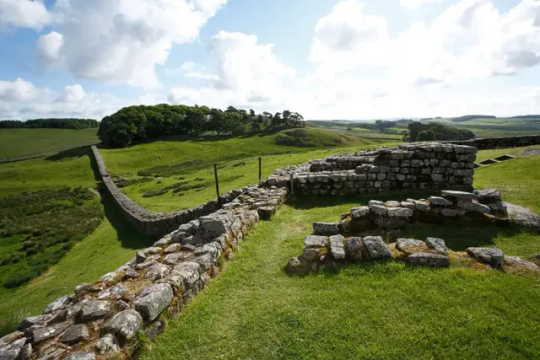
Hadrian, who ordered the wall to be built in 122CE after a visit to Britannia, had a different vision of empire than his predecessors, says Frances McIntosh, curator for English Heritage’s 34 sites along Hadrian’s Wall.
“All the emperors before him were about expanding the empire, but Hadrian was known as the consolidator,” she says. He relinquished some of the territory acquired by his predecessor Trajan, and “decided to set the borders” – literally, in some cases, with wooden poles at sites in Germany, or with stone in Britannia. Where those poles rotted thousands of years ago, the wall is still standing: “A great visual reminder” of the Roman empire, says McIntosh.
It’s not just a wall. There’s a castle every mile along, and turrets at every third-of-a-mile point, with ditches and banks both north and south. “You can imagine the kind of impact that would have had, not just on the landscape but on the people living in the area,” says McIntosh.
And thanks to the finds from the wall, we know a surprising amount about those people.
Although historians have long thought of army outposts as remote, male-dominant places, the excavations along the wall show that’s not the case. Not only were soldiers accompanied by their families, but civilians would settle around the settlements to do business. “ You can almost see Housesteads as a garrison town,” says McIntosh. “There were places you could go for a drink and so on.”
The Roman rule of thumb was not to post soldiers in the place they came from, because of the risk of rebellion. That meant Hadrian’s Wall was a cultural melting point, with cohorts from modern-day Netherlands, Spain, Romania, Algeria, Iraq, Syria – and more. “It was possibly more multicultural because it was a focus point,” says McIntosh, who says that the surrounding community might have included traders from across the empire.
Soldiers were split into two groups. Legionaries were Roman citizens from Italy, who had more rights than other soldiers and imported olive oil, wine and garum (a sauce made from decomposing fish).
They worked alongside auxiliaries – soldiers from conquered provinces, who had fewer rights, but could usually acquire citizenship after 25 years of service.
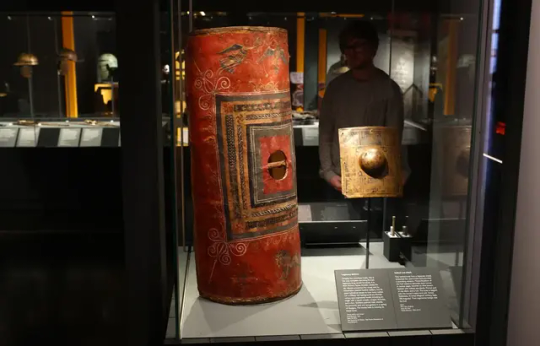
Soldiers carved their names and regiments on stones to show which part of the wall they built – around 50 of them are on display at Chesters fort.
But the wall shows that women and children were equally present.
McIntosh says that pottery brought to the camps – from the Low Countries and North Africa – shows that the soldiers “brought their families, who cooked in traditional style.” Archaeologists have found what seems to be an ancient tagine for North African-style cooking.
A tombstone from Arbeia fort for a woman named Regina shows she was a freed slave from southern Britain who was bought by – and married to – a Syrian soldier.
Another woman buried at Birdoswald fort was laid to rest with chainmail that appears to be from modern-day Poland. “Perhaps she married someone in the army,” says McIntosh, who calls the wall a “melting pot of people from all over the world under the banner of the army.”
“They brought their own religions, as well as worshipping Roman gods and adopting local deities,” she adds. At Carrawburgh, a temple to Mithras – an originally Persian deity – sat near a spring with a shrine to a local water spirit.
‘Wretched little Brits’
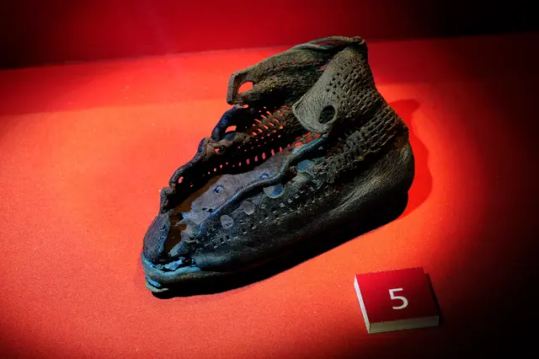
Some of the most extraordinary finds from the Roman empire are coming from one site on Hadrian’s Wall: Vindolanda. Here, archaeologists have found a wealth of organic remains because of what curator Barbara Birley calls the “unusual conditions onsite.”
At Vindolanda there are the remains of at least nine forts over 14 levels. “When the Romans would leave, they would knock down timber forts, and cover the area with turf and clay, sealing the layers underneath,” she says.
“Because it happened so many times, the bottom five or six layers are sealed in anaerobic conditions, so things don’t decay. When we get down there, we get wooden objects, textiles, anything organic.”
Vindolanda has the largest collection of Roman textiles from a single site in western Europe, as well as the largest leather collection of any site in the Roman empire – including 5,000 shoes, and even a broken leather flip-flop. “We probably had a population of 3,000 to 6,000 depending on the period, so 5,000 is a lot,” says Birley. For Abdy, the shoes evoke the conditions of the wet borderlands. “Women’s and children’s shoes are hobnailed – you needed it in the mucky frontier dirt tracks. They’re very evocative.”
There’s even a wig made from a local plant, hair moss, which is said to repel midges – the scourge of Scotland during the summer. A centurion’s helmet is also crested with hairmoss – the ancient equivalent of spraying yourself with insect repellent.
The first woman to write in Latin
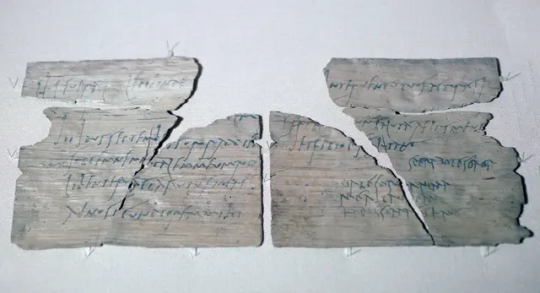
One of the most famous finds is the trove of wooden writing tablets – the largest found anywhere.
“They give a snapshot of what life was actually like,” says Birley. “We understand so much more from written correspondence than from ‘stuff,’ and, archaeologically, it’s the stuff that usually survives – things like metals and ceramics.
“These were written in ink, not on a wax stylus tablet, and we believe they were used for what we’d put in emails: ‘The roads are awful,’ ‘The soldiers need more beer.’ Everyday business.”
The tablets – or “personal letters” as Birley describes them – were found on the site of a bonfire when the ninth cohort of Batavians (in the modern-day Netherlands) were told to move on.
“They had a huge bonfire and lots of letters were chucked in the fire. Some have been singed – we think it may have rained,” she says. One of them calls the locals “Britunculi” – “wretched little Brits.” Another talks about an outbreak of pinkeye. One claims that the roads are too bad to send wagons; another laments that the soldiers have run out of beer.

Among the 1,700 letters are 20 that mention a woman called Sulpicia Lepidina. She was the wife of the commander of the garrison, and seems to have played a crucial role. There’s a letter to her from another woman, Paterna, agreeing to send her two medicines, one a fever cure.
Birley says it’s similar to today. “If you’re a group of moms, still today we say, ‘Do you have the Calpol?’ It’s very human.” For Abdy, it’s a sign that women were traders. “She’s clearly flogging her medicines,” he says. “It’s really great stuff.”
Another tablet is an invite from Claudia Severa, the wife of another commander at a nearby camp. It’s an invitation to a birthday party. Under the formal invitation, presumably written by a scribe, is a scrawl in another hand: “I shall expect you, sister. Farewell, sister, my dearest soul.”
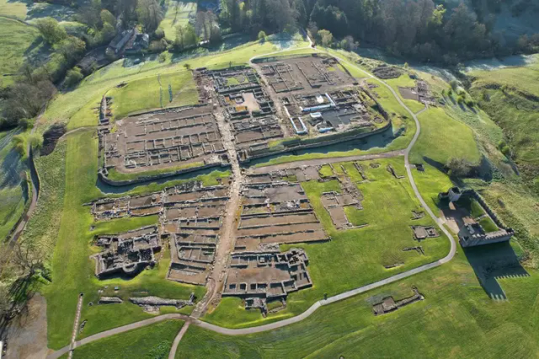
Presumably written by Claudia herself, it is thought to be the earliest example of a woman’s handwriting in Latin.
Without the organic finds – the shoes and the letters that indisputably belonged to women, unlike jewellery or weaving equipment – it’s difficult to prove conclusively that women lived in significant numbers. Vindolanda “illustrate the missing gaps,” says Abdy. For Birley, they prove that women were as crucial a part of army communities as men. “Before the Lepidina tablets were found we didn’t really understand the interactions between the soldiers and their wives,” she says. Another tablet is written by what is thought to be a Spanish standard-bearer’s common-law wife, ordering military equipment for her partner.
“The Vindolanda collection is showing that there weren’t just camp followers and prostitutes; women were part of everyday life, and contributing to the military community in many ways,” says Birley.


Abdy says that Hadrian’s Wall is interesting because the resident women span “all classes of society,” from Regina – the dead freedwoman, who would have been “bottom of the heap” – to the trader Paterna and the noblewoman Lepidina.
And of course, there’s the wall itself.
“In the Netherlands and Germany the finds are often stunning and better preserved – you go to museums and are bowled over. But in terms of structural remains, Hadrian’s Wall must be among the best,” says McIntosh, modestly, of her site.
Abdy agrees: “I can’t think of many symbols so redolent of imperial will than that wall.”
By Julia Buckley.

#How Hadrian’s Wall is Revealing a Hidden Side of Roman History#Hadrian’s Wall#emperor hadrian#northwestern boundary of the Roman Empire#Britannia#Caledonia#roman legions#ancient artifacts#archeology#archeolgst#history#history news#ancient history#ancient culture#ancient civilizations#roman history#roman empire#long post#long reads
912 notes
·
View notes
Text
Womens history just got richer.

When the deeply patriarchal Romans first encountered Celtic tribes living in modern-day France and Great Britain in the first century B.C.E., their reaction to the roles of the sexes was one of surprise and dismay. The tasks of men and women “have been exchanged, in a manner opposite to what obtains among us,” wrote one Roman historian.
New evidence from Celtic graves now confirms that at least one part of Britain was a woman’s world long before the Romans arrived—and for centuries afterward. One ancient British tribe known as the Durotriges based its family structure—and perhaps property inheritance—on kinship between mothers and daughters. Men, meanwhile, left home to live with their wives’ families, a practice known as matrilocality that has never been seen before in European prehistory.
The work, published today in Nature, helps explain why women in Iron Age Britain are often buried with high-status grave goods such as mirrors and even chariots, says Ludwig Maximilian University of Munich archaeologist Carola Metzner-Nebelsick, who was not involved with the research. “It’s a fantastic result,” she says. “It really helps explain the archaeological record.”
Ancient histories—not least Julius Caesar’s 50 B.C.E. account of invading Gaul—hinted at female empowerment among the Celts. “They wrote about it because they found it so weird,” says Trinity College Dublin geneticist Lara Cassidy.
Many modern historians assumed the accounts were exaggerated; they dismissed rich female graves from the time as outliers. But over the past few decades, archaeologists comparing burial practices at hundreds of Iron Age sites from Britain to Germany began to think there was a kernel of truth to the Roman reports.
The Durotriges cemeteries, located in the far south of England near the city of Bournemouth, offered a way for Cassidy and her team to investigate. Burials there began around 100 B.C.E., roughly 150 years before Roman forces invaded the island. Unusually for Iron Age Britain, the tribe didn’t cremate their dead. Instead they buried them close to home, in the hills surrounding their farmsteads.
Whereas men were laid to rest with a joint of meat and perhaps a pot containing a beverage to sustain them on their journey into the afterlife, Durotriges women are often found with elaborate offerings including mirrors, combs, jewelry, and even swords. “If you judge social status by burial goods, then female burials have vastly more than male,” says Bournemouth University archaeologist Miles Russell, a co-author of the new paper.
Over the past 4 years, researchers sequenced DNA from dozens of Durotriges skeletons in a set of cemeteries in Dorset, England. By matching identical fragments of genetic material from different individuals, they reconstructed a family tree that spanned six generations—many of whom were female descendants of a single female founder. Two-thirds of the people in the kin group buried in the cemetery shared a rare type of mitochondrial gene, a form of DNA inherited only from the mother, including some of the men who shared the same female ancestor.
Other genetic evidence from the Durotriges cemeteries pointed to matrilocality, showing that men joined the clan from other families. “Women are staying close to family and are embedded in the support network they’ve known since childhood,” Cassidy notes. “It’s the husband who’s coming in as a stranger and is dependent on the wife’s family.” Women were evidently a force to be reckoned with in this part of Iron Age Britain.

Archaeologists have found that members of Great Britain’s Durotriges tribe often buried women with more grave goods than men.Miles Russell/Bournemouth University
Such patterns could help explain finds elsewhere in the Celtic world, where women were sometimes buried with rich grave goods or even chariots. “We’re thinking this could have been quite widespread,” Cassidy says.
To gather further evidence, she and her colleagues re-examined previously published genomes from more than 150 sites in Britain and Europe stretching back to the Stone Age. Starting around 500 B.C.E., the diversity in people’s mitochondrial DNA declined, the team found, suggesting more of them shared the same female ancestors. There was no matching decline in the diversity of Y chromosomes, which are passed from fathers to sons.
That suggests communities across Britain were anchored by specific female lines, with men marrying in from outside. “The signal they see in [the Durotriges] case study can be reproduced in other British sites,” says Max Planck Institute for Evolutionary Anthropology archaeogeneticist Joscha Gretzinger, who was not involved with the work. “That’s quite a smoking gun.”
The study is part of a growing use of DNA to reconstruct genetic kinship in the deep past—and use it to shed light on the structure of past societies. University of Liverpool archaeologist Rachel Pope says the research is starting to highlight the wide variety of social organization people practiced in the past, something archaeology has hinted at over the past 2 decades.
Some of the earliest kinship studies using ancient DNA, for example, showed that Stone Age farmers in Britain and France living in the fifth millennium B.C.E. were organized patrilocally, with women leaving their homes to marry while men stayed put. The new data from Durotriges suggest that by the Iron Age, 4000 years later, something had shifted. “This is quite exciting,” Pope says. “There are moments in time in which societies seem to have a lot of high female status.”
#Women in history#ancient britain#ancient British tribe known as the Durotrig#matrilocality#Bournemouth
301 notes
·
View notes
Text
Blood Purity and a Declining Birth Rate
Voldemort’s promise to restore pureblood supremacy isn’t just a call to arms; it’s a lifeline for a community terrified of its own obsolescence.
The wizarding world is haunted by more than just literal ghosts; it is a world that seems to be shrinking, its former grandeur fading into memory. Signs of decline are everywhere: Hogwarts, once a bustling center of magical education, has unused classrooms and seemingly fewer students than one would expect for the only magical school in Great Britain and Ireland. Diagon Alley, supposedly the heart of the magical community in one of the world’s largest cities, consists of just a few streets. Even wizarding media is centralized in a single newspaper.
These clues suggest a world that was once much larger than it is now. There are references to better days and implications that Hogwarts isn’t what it used to be now that Dumbledore is in charge. This decline is tied closely to the waning influence of pureblood families, who are becoming a smaller and smaller fraction of the wizarding population. Muggle-born and half-blood students outnumber them at Hogwarts, a shift that threatens the social and political dominance Purebloods have held for centuries.
What’s particularly interesting is how purebloods respond—or fail to respond—to their declining numbers. Unlike other extremist groups like Christian fundamentalists or white nationalists, who often promote large families as a "sacred duty" to maintain their cultural dominance (Hitler gave medals to women who had five or more children), pureblood families in Harry Potter are remarkably small. This lack of larger pureblood families raises questions about their long-term strategies for survival. If blood purity is their highest priority, why don’t purebloods prioritize reproduction as a means to preserve their numbers?
Draco Malfoy, the prime school-age pureblood antagonist of the main character, is an only child. Sirius Black and Regulus Black come from an ancient family with an extensive family tree, yet they have no siblings beyond each other and only three cousins. Bellatrix Lestrange, one of the most fanatical proponents of blood purity, didn’t have children until her late 40s—and even then, it is a single child (and only if you accept Cursed Child as canon).
Harry Potter himself comes from a pureblood family, but his only living relatives are his Muggle aunt and cousin. Neville Longbottom is raised by his grandmother, and while he mentions elderly relatives, there’s no indication of cousins his own age. Even the Weasleys, the exception to the rule with their seven children, seem to lack extended family—there are no Weasley cousins attending Hogwarts during Harry’s time.
The First Wizarding War can partially explain the small size of Harry’s generation: people were afraid to have children during Voldemort’s rise to power, and the violence of that decade wiped out much of a generation. However, this alone doesn’t account for the decline. Something must have happened in the previous generation as well. For several generations now, pureblood families haven’t been having enough children to maintain their population.
Another explanation could be that their intense focus on lineage and prestige means they are selective about marriage and procreation, limiting family size to maintain "purity" rather than expanding it. Marrying within a shrinking pool of acceptable partners likely leads to fewer unions and, consequently, fewer children. Additionally, inter-family rivalries, societal pressures, and a rigid class system may discourage collaboration between pureblood families to ensure survival.
While we see pureblood families of different economic status in the series it is also worth noting that smaller families may be a deliberate choice to consolidate wealth and maintain power within a single branch of the family, ensuring that resources aren’t dispersed among too many inheritors. By keeping family sizes small, they can preserve their status and influence in a society where lineage and financial stability are critical markers of power.
Alternatively, external factors not mentioned in canon could help explain the dwindling pureblood numbers. Perhaps a catastrophic outbreak of dragon pox ravaged Britain at the turn of the century, disproportionately affecting pureblood families due to their insular communities and close intermarriages. An economic crisis could also have made it difficult for even wealthy families to support large households, especially given the high costs of maintaining pureblood status and reputation. Such events would compound the social and cultural pressures already discouraging large families, contributing to a steady decline in pureblood populations.
The decline in a pureblood population creates a simmering panic among purebloods. They perceive that their traditions and way of life are changing, and instead of adapting to demographic shifts and embracing a more inclusive future, they cling to fear and resentment. They blame Muggle-borns for their loss of power, projecting their anxieties onto those they perceive as outsiders for “stealing” magic.
When those in positions of power feel their dominance slipping, they often construct narratives in which the oppressed will rise up and do to them what they, the ruling class, have done to others. This paranoia leads purebloods to double down on their exclusivity, believing that maintaining their power is the only way to avoid losing everything. Their refusal to adapt blinds them to the potential benefits of inclusivity: a larger magical community, a stronger economy with more people working wizarding jobs and purchasing wizarding goods, and a broader cultural foundation to sustain their traditions.
This fear and resistance to change create fertile ground for Voldemort’s rise. He exploits the purebloods’ anxieties, offering them a roadmap for radicalization. Instead of addressing the root causes of their decline, purebloods embrace the Dark Lord’s extreme methods, leading to catastrophic consequences.
The determination to "purify" the wizarding world and maintain their position of power ironically accelerates their downfall. As Death Eaters enact Voldemort’s vision, their crusade doesn’t simply target individual Muggle-borns but entire families—wiping out, or nearly wiping out, powerful, established wizarding lineages like the Bones, McKinnons, Longbottoms, and Potters. This destructive cycle ensures that even the pureblood families themselves suffer massive losses, further accelerating the population decline they sought to prevent.
Purebloods who embrace the politics of purity in an attempt to stave off extinction ultimately hasten their own downfall, prioritizing exclusivity and radicalization over growth and adaptation.
(thanks to @livelaughlovetoread for reading this over and beta reading!)
#harry potter#harry potter meta#harry potter analysis#voldemort#wizarding world#first wizarding war#second wizarding war
189 notes
·
View notes
Note
can you please recommend some TTRPGs that are
as different as possible from the trad/D&D-like "default" that people come into TTRPGs with (and also recommendations that are different from each other), and
deliberately structured for longer-term recurring play? something where the same group can run the same "campaign" for, say, half a year or more, and
has enough mechanical hooks to not lose new players in the sea of borderline-freeform onepagers?
thank you!
Apocalypse World fits all of those criteria. It's the game that the Powered by the Apocalypse framework of games is based on, and it's a very good post-apocalyptic drama game, where the focus is on people with very orthogonal goals getting thrown into a powderkeg with each other.
As I keep mentioning whenever I bring it up, Apocalypse World isn't about a bunch of weirdos forming an adventuring party and going on adventures. It's almost an asymmetric game and a drama generator, instead of a traditional D&D-like co-operative challenge game.
I do not think there is anything antithetical to long-term campaign play in Apocalypse World, although since character development is rather shallow it does eventually lead to characters plateauing. But the game has options for players playing multiple characters and actually heavily encourages it.
Is actually quite crunchy despite the wider reputation of PbtA games.
For a different take, there's Eureka: Investigative Urban Fantasy by @anim-ttrpgs. A modern urban fantasy investigative game with a focus on verisimilitude and a very historically grounded take on the supernatural.
While a challenge-based game the fact that it's an investigative game (and a damn good one at that) is already a huge change, and the fact that it disincentivizes the use of violence as the primary verb for characters also distinguishes it from the defaults set by D&D. (There is a lot more to it where it differs from modern D&D in terms of design philosophy, but I don't want to make this overlong.)
Eureka also has limited character advancement but it is explicitly geared towards bringing the same bunch of weirdos to investigate different mysteries. It can be played episodic or as an anthology and there's even been talk in the @anim-ttrpgs RPG book club about using it for a campaign that is all about investigating one big mystery.
Has a lot of mechanical grit, but also divides its mechanics into easily digestible chunks to make learning it easier.
Most Trusted Advisors by @thehorizonmachine. A comedy game about playing the advisors of a medieval lord in a very historically inaccurate medieval nation, always scheming against each other while trying to keep them on their lord's good side.
Very much not a party-based adventure game, but an engine for creating a comedy of errors starring a cast of fundamentally unlikable nobs in a quasi-medieval pastiche, in the style of Black Adder.
Admittedly, works better for episodic play and shorter campaigns, but I don't know, I think it's neat so I wanted to recommend it anyway!
Simpler than the previous two, but still provides enough mechanical structure not to leave players hanging.
For a classic, there's Pendragon. A game set in a historical-mythical-Britain of Arthuriana about playing through a dynasty of knights as they live through the Anarchy and get to see Arthur ascend to the throne, and finally get to witness his death and the fall of Camelot.
While it is a game of knights going on adventures it's also so much more: it has domain management, courtly romance, trying to be a good knight as opposed to an errant murderer and with actual mechanical incentives for it.
The Great Pendragon Campaign is huge and will give you enough material for years of play.
Not the crunchiest game out there, but still has a lot of mechanical structure while being mostly very intuitive.
Hmmm okay one more since I'm on a roll: Paranoia. A science fiction dystopian black comedy about playing Troubleshooters who help do dirty work for the insane egoistical computer that runs the Alpha Complex.
While it is a co-operative game it is also very much about pitting the player characters against each other. Paranoia is the name of the game. It's also decidedly humorous which sets it apart from your serious D&D-likes.
There's character advancement, secret goals given by conspiracies, and a lot of potential to see the Troubleshooters advance and flourish within the system that slowly grinds them to a paste.
Has mechanics. I mean, the rules and their depth will vary depending on which edition you're playing, but Paranoia definitely has some mechanical grit to it.
138 notes
·
View notes
Note
Hi :)) do you have any advice on writing stories about Celtic mythology? Ive been trying to use Wikipedia to learn more about it but I find the format of it isn’t very digestible for me and I end up not understanding it well
Writing Notes: Celtic Mythology
The ancient Celtic pantheon consisted of over 400 gods and goddesses who represented everything from rivers to warfare.
With perhaps the exception of Lugh, the Celtic gods were not universally worshipped across Iron Age Europe but were very often limited to only several regions or a specific area.
Another difficulty in examining the Celtic pantheon is the paucity of written records produced by the Celts themselves; quite often a god (deivos/deiva) is named in only a single surviving inscription.
To further complicate our lack of knowledge, the Celts often gave all-embracing powers and attributes to their gods which means that they can rarely be easily categorised.
Celtic votive inscriptions from the Roman period often name a Celtic god with a Roman equivalent noted alongside, a practice known as the interpretatio romana. The following are a few major deities or those with multiple or significant inscriptions.
Andarta - a Celtic goddess whose name may derive from the Celtic word for the bear animal.
Borvo (also Bormo) - a god whose name likely derives from the Celtic word meaning 'to boil' and so indicates his frequent association with natural hot springs.
The Dagda - an Irish-Celtic god whose name is usually preceded by the definite article. His name likely means 'the good god', probably in the sense of being 'many-skilled'. His common attributes are a great club, which can both kill and bring the dead back to life, and a giant cauldron that can produce an inexhaustible quantity of food, especially porridge.
Danu (also Dana) - a Celtic mother-goddess who gives her name, which means 'stream' or 'the waters of heaven' to various places and the River Danube.
Genii Cucullati - mysterious Celtic divinities which are not given a name but appear in groups or alone and wear hooded cloaks in art. Depictions typically have them near a single better-known god and holding either an egg or a scroll.
Nemetona - a goddess whose name derives from the Celtic term for a sacred grove of trees (nemeton). Votive inscriptions naming the goddess survive from both England and Germany, some of which indicate she is the partner of Mars. The goddess had temples dedicated to her at Klein-Winternheim and Trier, both in eastern Germany.
Suleviae - this is a group of Celtic sister goddesses who were venerated in Britain, Germany, and Rome (where there were many Celtic mercenaries). The trio was most likely seen as protective figures and associated with regeneration.
Read the full list here. More Celtic mythology concepts and themes:
Albion - Ancient Celts referred to Britain—not including Ireland—as Albion and only later as Britannia. The Romans connected Albion through their word albus, meaning “white,” with the white cliffs of Dover. Geoffrey of Monmouth reported that the Celts believed a certain Albion who ruled the island was a giant fathered by a god of the sea. Others believe the island was named for a princess who came to the island with fifty women who in their former home had killed their husbands.
Belenus - Also known in Celtic Ireland and Britain by various names—Bel, Belinos, Beli, Bile—Belenus is a god of Celtic Gaul whom Julius Caesar compared to the Greco-Roman Apollo as a solar god of light and reason. He carries a solar disk on the chariot that he presumably uses to travel daily across the sky. His British name is the source for Billingsgate in London. Fires in honor of the god were lit for Celtic festivals of Beltaine (“Bel’s Fires”) on May 1.
Cernunnos - A horned Celtic god of Gaul (modern France) and parts of the British Isles, Cernunnos was a god offertility, like the Italian goddess *Ceres. He carries a club and is lord of the animals. Perhaps because of his association with planting and seeds, he was associated with the underworld. The Romans linked him to Mercury, who led souls to the underworld, and to Apollo, as he provided light for the dead in their graves. Sometimes he is equated with Dispater and the Irish Dagda.
Decapitation - An important theme in Celtic mythology in general and Irish and Welsh mythology in particular. The story of Bricriu’s Feast is a decapitation myth, as is the Welsh story of Bran. The theme influenced the Arthurian myths and the medieval English romances such as Sir Gawain and the Green Knight. Earlier decapitation stories are found in the Bible—including the tales of David and Goliath, Judith and Holofernes, and Salome and John the Baptist. There is also decapitation in the Greek myth of Perseus and Medusa, and in the Mesopotamian myth of Gilgamesh and Humbaba. The decapitation theme—especially when associated with a “green man” such as Gawain’s Green Knight, the Aztec Corn King, or many Native North American Corn Mothers—may well have its roots in sacrificial rituals of fertility. Heads that have been cut away from the body, as in the case of Bran’s head, continue to function and talk in Celtic mythology, suggesting a belief in the head’s being the seat of the soul as well as of power and fertility.
Dis Pater - In the Gaulish, that is, continental Celtic mythology, Dis Pater was the Roman name provided by Julius Caesar for a god claimed by the Gauls as their father god, or ultimate progenitor. The name given by Caesar suggests that the Romans saw a connection between this deity and the otherworld or underworld. As, literally, “underworld father,” Dis Pater is naturally associated in Caesar’s mind with the Roman Pluto. The Irish cognates would probably be the Dagda, the father god of the Tuatha De Danaan, and Donn, the god of the dead.
Druids - The priestly class in early Celtic societies, especially continental Celts. They were judges and seers with great moral authority, who ranked above all other classes. As such, they were the equivalent of their Indo-European brothers, the Indian brahmans. The Romans in Gaul developed myths about the druids such as the one suggesting that they practiced human ‘sacrifice. The Irish filidh may be said to have somewhat diminished druidic standing. The great Celtic bards Taliesen and Amairgen had druidic qualities and authority.
Epona - It was primarily the continental Celts who revered Epona, the horse goddess. She was naturally adopted as a favorite by the Roman cavalry and was celebrated at an annual Roman festival. Epona has certain earth goddess aspects, such as her strong association with fertility, sexuality, and water. In Welsh mythology, Epona appears to have had a cognate in the fertility-warrior goddess Rhiannon, who rode about Wales on a white horse dispensing gifts, in the traditional great goddess manner, from her bag or womb bundle.
Irish mythology
Lugus - His name, referring to brightness, indicates that the continental Celtic god Lugus, whom Julius Caesar equated with the Roman Mercury, was a cognate of the Irish Lugh and the Welsh Lleu. Lugus was a god of the arts.
Maponos - Son of the continental Celtic mother goddess Matrona, has a Welsh cognate in Mabon, as Matrona has one in Modron. Maponos was the divine child— the puer aeternus—of Celtic mythology.
Matrona - In the continental Celtic tradition, Matrona, whose counterpart in Welsh mythology was Modron, was the mother goddess whose son was the divine child Maponos (Welsh Mabon).
Nehalenia - A Germanic and possibly continental Celtic sea goddess who protected voyagers.
Taranis - (Taranus) was compared by Julius Caesar to the Roman god Jupiter. Taranis was the thunder and storm god of the continental Celts of Gaul. He was an aspect of the typically Indo-European triad of Esus, Taranis, and Teutates.
Arthurian Mythology
Annwn - (Caer Feddwid) is a name for the Welsh Otherworld, where a magic cauldron exists. In a medieval Arthurian tale, Preiddeu Annwn (The Spoils of Annwn), Arthur and his knights go to Annwn to obtain the cauldron, which, as indicated by the possession of the Cauldron of Plenty by the Dagda, the father god of the Irish Tuatha De Danaan, was a symbol of sacred kingship. Arthur and the few of his men that remained return empty-handed. The tale is seen as a prototype for the story of the Holy Grail.
Camelot - The castle and primary dwelling place of King Arthur, the seat of the fellowship known as the Round Table. It was at Camelot that the Holy Grail appeared to the knights of the Round Table. Many places in England to this day claim to be the site of the legendary castle. Camelot was first mentioned by Chretien de Troyes in his twelfth-century work Lancelot. Supposedly Camelot was destroyed after Arthur’s death. During the early stylish and optimistic years of the American presidency of John F. Kennedy, it became customary to speak of Kennedy and his followers in the White House, and of the administration as a whole, as “Camelot.”
Chretien de Troyes - A French poet of the 12th century C.E., Chretien wrote metrical romances about the ‘Welsh-British ‘hero ‘King Arthur and his knights of the ‘Round Table. Most famously, he wrote Perceval or the Story of the Grail, about ‘Percival (Parsifal) and the ‘quest for the ‘Holy Grail; and Lancelot, or the Knight of the Cart.
Fisher King - In the Arthurian story, the Fisher King is a somewhat ambiguous figure who is encountered in various conflicting versions by hero-knights of the Round Table— particularly Percival—during the quest for the Holy Grail. The King is in some sense wounded, a fact that affects the fertility of the land he rules. Some say that the King—Pelles, Parian, or Pellam—was guardian of the Grail but that he had sinned and was thus unable to speak when the Grail appeared before him. The King can be cured of his wounds or his speechlessness only when certain questions are asked of him. But when Sir Percival comes to the Fisher King’s castle and the Grail passes by him in procession, he fails to ask any questions about it, and the King remains under the terrible spell.
Galahad - Originally Gwalchafed in Welsh, Sir Galahad was a knight of King Arthur’s Round Table in medieval Arthurian sagas. His story had strong heroic mono- mythic elements. Galahad was the son of Sir Lancelot and the Lady Elaine, whom Lancelot had been tricked by a potion into thinking was his beloved Guinevere. Galahad was brought up by a nun and then knighted by his father and taken to Arthur’s court. He was, above all, pure, and it was this quality that made it possible for him, of all knights, to succeed in the quest for the Holy Grail. Galahad appears in Arthurian lore in a thirteenth-century French cycle of romances. La queste del saint graal (“The Quest for the Holy Grail”). In Sir Thomas Malory’s Le morte d’Arthur, Galahad achieves apotheosis; he is taken up to Heaven.
Guinevere - In the Arthurian romances, including those of Chretien de Troyes, the Welsh historian Geoffrey of Monmouth, and Sir Thomas Malory, Guinevere (Welsh Gwenhwyfar) is the wife of King Arthur and the beloved of Sir Lancelot. There are conflicting tales of Guinevere’s origins. Some traditions hold that she was the daughter of Leodegan, who gave the Round Table to Arthur when the latter married his daughter. Her love for Lancelot led to the disruption of Camelot and the fellowship of the knights of the Round Table, and eventually to Arthur’s death. Some say she married Mordred after Arthur’s death. More often it is said that she retired to a nunnery.
Holy Grail - or Sangreale in Old French, was an important quest object in the Arthurian tradition, particularly connected with Percival, as in the Perceval of Chretien de Troyes (c. 1185) and the slightly later Parfval of Wolfram von Eschenbach. Whatever the original source of the legends of the Grail, Christianity associated it with one of the vessels used by Jesus at the Last Supper.
King Arthur - Legendary British king who appears in a cycle of medieval romances (known as the Matter of Britain) as the sovereign of a knightly fellowship of the Round Table. It is not certain how these legends originated or whether the figure of Arthur was based on a historical person. The legend possibly originated either in Wales or in those parts of northern Britain inhabited by Brythonic-speaking Celts.
Lancelot - The son of King Ban of Benwick or Brittany, Sir Lancelot, or Lancelot of the Lake—so called because he was raised by Vivienne, the mysterious Lady of the Lake, who stole him at birth—was one of the noblest knights of King Arthur’s Round Table. But his love affair with Arthur’s queen, Guinevere, would lead to the downfall of Camelot and the fellowship of knights. Sir Galahad was Lancelot’s son by the Lady Elaine, who tricked him into thinking she was Guinevere and so made love with him. Galahad would succeed in the quest for the Holy Grail where his father had failed. Lancelot rescued Guinevere when she was about to be burned at the stake for adultery. When Guinevere and Lancelot fled to Brittany, Arthur followed them and his illegitimate son or nephew, Mordred, usurped his throne. This led to a war in which both Mordred and Arthur were killed. When Guinevere retired to a nunnery, Lancelot, too, took religious vows. The Lancelot story is found in the works of Chretien de Troyes and Sir Thomas Malory.
Mabinogion - The “Welsh Mabinogion is found in two fourteenth-century manuscripts, the White Book of Rhydderch and the Red Book of Hergest. The collection, based on oral narratives, probably took literary form between the mid-eleventh to the early twelfth centuries.
Malory - Sir Thomas Malory is the fifteenth-century English author of Le Morte d’Arthur, an important compilation of Arthurian material. He is said to have created his great prose work while in prison.
Merlin - Probably has an antecedent in the legendary Scottish and/or Irish mad prophet Myrddin (Merddin). The Welsh historian Geoffrey of Monmouth, in his twelfth-century History of the Kings of Britain, established Merlin’s position as the motivating wizard in the Arthurian legend. It was Merlin who helped arrange for the liaison between Uther and Igraine that would lead to the conception and birth of King Arthur. After Arthur’s birth Merlin took the child to one Hector, this in keeping with the monomythic heroic divine child’s being raised by a menial or commoner. It was Merlin who arranged for the ceremony through which Arthur would prove himself to be the king by removing a sword from a rock. There are many versions of Merlin’s life. It was said by some that he was conceived as a result of the union between a sleeping nun and a demon. In Sir Thomas Malory’s Le Morte d’Arthur, based on many earlier sources—many of them specifically about Merlin—the magician falls in love with an enchantress, Nimue (perhaps the Lady of the Lake), a femme fatale who imprisons him under a rock.
Welsh Mythology
Has come to us from various sources, all much more directly affected and distorted by time and non-Celtic elements than is the case in the much more isolated Ireland.
There are the two Latin texts especially concerned with the Arthurian legends—the early-ninth-century Historia Brittonum by Nennius and the twelfth-century Historia Regum Britanniae by Geoffrey of Monmouth—and there are, of course, oral sources, including, traditionally, poems questionably attributed to the semi-mythic sixth-century poet-prophet Taliesin, whose Irish equivalent was Amairgen, the poet-warrior.
But Welsh mythology, including the remnants of a pre-Christian Welsh pantheon, is more essentially contained in the “four branches” of a collection of eleven medieval tales known in modern times as the Mabinogion {Mabinogi) and in the various traditions associated with King Arthur.
Sources: 1 2 3 4 5 ⚜ More: References ⚜ Writing Resources PDFs
Hi, consuming a lot of media on the topic would be important for your story. These are just a few excerpts from the sources I was able to find, which you can go through in the links above (+ the other references the authors mentioned). Find the right balance between your research and the direction you want your own story to go. Hope this helps with your writing!
#anonymous#celtic#mythology#writeblr#dark academia#literature#writing reference#creative writing#writers on tumblr#spilled ink#writing prompt#writing inspiration#writing ideas#light academia#writing resources
98 notes
·
View notes
Text
Thai BL isn't lesser. It just has different aesthetic goals. It often prioritizes what some would call a theatrical style to filmmaking over a cinematic one.

Theatrical approaches, in the US at least, are currently associated with older films and television. They're also linked to contemporary shows in what are currently thought of as more conservative genres like youth-oriented cable programming (think Nickelodeon or the Disney Channel), soap operas, and sitcoms.
However, the theatrical style in the west has been at other times very much associated with cutting-edge subversion and queer camp. In the 80s and 90s, for example, counter-cultural cinema projects leaned heavily towards more theatrical approaches in the face of blockbuster corporate sheen. The films grouped into the Queer New Cinema loved to play with this. Consider the bold colors, static shots, and unsubtle dialogue in But I'm a Cheerleader.

In the 50s and 60s, the theatricality of sitcoms was a site of transgressive feminism and gender representations like in Bewitched (see more in The Queer Fantasies of the American Family Sitcom or Camp TV: Trans Gender Queer Sitcom History, among others).

Both those eras used theatricality for a number of reasons: budgetary necessity, subsequent technological limits, but also as a counter to the different kinds of elitism associated with the cinematic style in those periods (intellectual in the 50s and 60s and corporate in the 80s and 90s).
Cinematic style didn't begin to fully emerge anyway until the 1940s and 1950s with lenses and cameras that could depict greater depth and move through the spaces the characters were inhabiting. Before that, theatrical presentation was simply the only option. So Old Hollywood is rife with theatricality, and plenty of of those films still have the power to move audiences and feel surprisingly relevant with their visual and scripted commentary. Camille, with what some consider to be a nearly all-queer cast and main production crew and one of Greta Garbo's best performances, holds up incredibly if you're willing to accept its theatrical diva-licious approach.

But plenty of the Old Hollywood films are also duds along with the other eras mentioned. Theatricality, like cinematic approaches, is not inherently more queer or superior to other forms. They're just styles. As Zadie Smith wrote, "In Britain, we are always doing this: mistaking an aesthetic choice for an ethical one." I'm guessing that tendency is pretty universal, either mistaking aesthetic choices for ethics or, even more often, quality.
Appreciating theatricality will hopefully help you understand other choices in Thai BL with less judgment, though. The comic sound effects, jarring as they might be for western audiences who've had laugh tracks and sound effects sequestered away from much of their 'prestige' media, are an artistic choice in their own right that Thai BL has refined over the years to work as leitmotifs (small repeated sound sequences) in the series that reiterate the themes.
Two great examples of sound cues came out last year even as their cinematography leaned more towards a cinematic style. The Trainee, a GMMTV show about a film production company, used computer error sounds as a comedic beat when characters' fucked up, while Kidnap had a pathetic dog whimper, which created more sympathetic characters, like injured puppies who needed love and patience to recover from their injuries.

There's an art to using these theatrical tools in productions. I was rewatching an episode of Little Bear recently and Mother Bear blew out a candle, which was indicated not by a blowing sound effect but a clarinet trill. So much more tender! These sorts of sonic tricks were used beautifully throughout silent films, opera, and symphonies in the West for years. It merely fell out of fashion outside of cartoons and some comedies.
But just because certain tastes or practices were deserted or designated for "low-brow" entertainment in one culture, doesn't mean that other cultures are somehow 'behind' or 'lesser' for their use of it. Both cultures are equally contemporary to one another. One is not more advanced just because it has a stronger economy or easier access to certain goods and technologies. Nor does the designation of 'low-brow' to some art mean that the 'low-brow' entertainment is actually less skillful or impactful. The viewer just might lack an appropriate angle to appreciate it from or there might easily be cultural biases at play, not just across different cultures but regarding social status and rules within a single culture (and bother are something we ought to be very sensitive about when dealing with queer media).

I want to look at one of my favorite aspects that comes out of Thai BLs preference towards theatricality. The performances, and even certain production elements, often burst with spontaneity, clumsiness, exuberance. It can infect an audience with joy as the shows demonstrate what we often call (from lack of clearer aesthetic terminology) "heart." Dismissively, plenty of fans refer to the 'heart' of Thai series as if its unintentional and unrelated to the elements of the series they see as inferior. Its the sweet taste that got them addicted to a guilty pleasure! The 'heart,' though, comes from the Thai creators prioritizing a view of human messiness over the technical precision preferred by a cinematic aesthetic.
Thai BL often has a similarity to live theater in this manner, as well as improvisation-based media. Again, these are not lesser forms of art. I bring up improv specifically because it's easy to believe that the lack of pre-planning and compositional directive ought to diminish it in the made-up hierarchy people have going in their heads. Yet, we have Mike Leigh, a British director of dramedies, and Christopher Guest, an American comedy director, both famed and critically celebrated for their humanist works founded in improvisation.

You won't find me arguing that all Thai BLs are successful or that one country's BLs are somehow better than another's. I just do my best to understand, explain, and make meaningful comparisons to appreciate the aesthetic goals I see shows' evoking. It's also fun to look into influences beyond my own cultural scope and love (and repost) when others' share them. What are specific East and South Asian media reference points that influence the style of the shows (lakorn, literary BL media, Thai traditional theater)? I'd be remiss not to mention, for example, that the theatrical traditions for Thai shows derive mainly from Asian traditions in cinema and theater, despite all my comparisons to Western history!
Then there's the question of local political, economic, and cultural issues and limits that the creators live alongside and must create within and/or against to some extent. I'll never know all the answers, but exploring the questions is so much more fun than disparaging shows for what they aren't and what they can't or don't aim to be.
But look, I personally have a preference for the style a lot of Thai BLs go for. It reminds me of the cartoons, musicals, DCOMs, and vintage tv I've loved watching for most of my life. I like the variant gender and sexuality representations they offer. I like the intricate economic-political commentary I see the writers working into the subtext. It's not going to resonate for everyone, not everyone will see what I see, and all that's okay. I've personally never been happier with the amount of series' that match my tastes.

99 notes
·
View notes
Text






📸 🎥 BBC
Dan/Neal almost pressured Stan/Stricker as early as the second set’s start, but even if Stan’s backhand error caused the deuce, it did not cause too much panic as they held to 1-1 to start the second set. This was followed by Dan/Neal’s two smashes to hold their service games (2-1) to compensate the previous mistake, where Neal backed down from the net, which appeared to be costly at the end of the day. Several games later, Stan’s volley as an equalizer to *2-2 15-15 somehow became an attention-grabber, but Neal’s failed forehand several points later paved the way for Stan/Stricker to create a break point at the expense of Neal’s volley that went too wide. However, the damage was immediately averted with an unreturned serve, and Dan/Neal finally held their service games several points later to 3-2 thanks to a working serve+1.
Almost similarly with the first set, Neal’s swift return opened the path for the equalizer before Dan’s forehand return ace successfully went past Stricker in the open court, creating their break point that was immediately converted at the expense of Stan’s intended +1 backhand going too wide, securing the Brits the important break to 4-2. Interestingly, Dan/Neal’s point construction prowess continued with Dan’s forehand executed from the corner of the court, finalizing it with Neal’s smash to avert a potential damage before they held to 5-2.
Two games later, Dan/Neal had the opportunity to serve for the match (on Dan’s serve). Despite Stricker’s swift return turned out to be in for an equalizer to *5-3 30-30, Dan/Neal still nailed their service games until they had a match point, which was immediately converted thanks to an unreturned serve. As a result, Dan/Neal took the second set 6-3, as well as winning the tie for the United Kingdom to open their Final 8 qualifying chance a little bit more in a wide-open group.
#atp world tour#atp tour#davis cup#davis cup 2023#davis cup: world group#davis cup finals: group stage#davis cup finals 2023: group b (manchester)#great britain v. switzerland#daniel evans#neal skupski#dominic stricker#stan wawrinka#WatchMoreDOUBLES
0 notes
Text
“May I be permitted to say a few words? I am an Edinburgh graduate (MA 1975) who studied Persian, Arabic & Islamic History under William Montgomery Watt & Laurence Elwell Sutton, 2 of Britain ‘s great Middle East experts. I later went on to do a PhD at Cambridge & to teach Arabic & Islamic Studies at Newcastle University . Naturally, I am the author of several books & 100s of articles in this field.
I say all that to show that I am well informed in Middle Eastern affairs & that, for that reason, I am shocked & disheartened for a simple reason: there is not & has never been a system of apartheid in Israel. That is not my opinion, that is fact that can be tested against reality should anyone choose to visit Israel.
Let me spell this out, since I have the impression that many students are absolutely clueless in matters concerning Israel, & that they are, in all likelihood, the victims of extremely biased propaganda coming from the anti-Israel lobby.
Hating Israel
Being anti-Israel is not in itself objectionable. But I’m not talking about ordinary criticism of Israel . I’m speaking of a hatred that permits itself no boundaries in the lies & myths it pours out. Thus, Israel is repeatedly referred to as a “Nazi” state. In what sense is this true, even as a metaphor? Where are the Israeli concentration camps? The einzatsgruppen? The SS? The Nuremberg Laws?
None of these things nor anything remotely resembling them exists in Israel, precisely because the Jews, more than anyone on earth, understand what Nazism stood for. It is claimed that there has been an Israeli Holocaust in Gaza (or elsewhere). Where? When?
No honest historian would treat that claim with anything but the contempt. But calling Jews Nazis and saying they have committed a Holocaust is a way to subvert historical fact. Likewise apartheid.
No Apartheid
For apartheid to exist, there would have to be a situation that closely resembled how things were in South Africa under the apartheid regime. Unfortunately for those who believe this, a day in any part of Israel would be enough to show how ridiculous this is.
The most obvious focus for apartheid would be the country’s 20% Arab population. Under Israeli law, Arab Israelis have exactly the same rights as Jews or anyone else; Muslims have the same rights as Jews or Christians; Baha’is, severely persecuted in Iran, flourish in Israel, where they have their world center; Ahmadi Muslims, severely persecuted in Pakistan & elsewhere, are kept safe by Israel; or anyone else; the holy places of all religions are protected by Israeli law.
Free Arab Israelis
Arabs form 20% of the university population (an exact echo of their percentage in the general population). In Iran , the Bahai’s (the largest religious minority) are forbidden to study in any university or to run their own universities: why aren’t your members boycotting Iran ?
Arabs in Israel can go anywhere they want, unlike blacks in apartheid South Africa. They use public transport, they eat in restaurants, they go to swimming pools, they use libraries, they go to cinemas alongside Jews — something no blacks were able to do in South Africa.
Israeli hospitals not only treat Jews & Arabs, they also treat Palestinians from Gaza or the West Bank. On the same wards, in the same operating theatres.
Women’s Rights
In Israel, women have the same rights as men: there is no gender apartheid. Gay men & women face no restrictions, and Palestinian gays oftn escape into Israel, knowing they may be killed at home.
It seems bizarre to me that LGBT groups call for a boycott of Israel & say nothing about countries like Iran, where gay men are hanged or stoned to death. That illustrates a mindset that beggars belief.
Intelligent students thinking it’s better to be silent about regimes that kill gay people, but good to condemn the only country in the Middle East that rescues and protects gay people. Is that supposed to be a sick joke?
(…)
I do not object to well-documented criticism of Israel. I do object when supposedly intelligent people single the Jewish state out above states that are horrific in their treatment of their populations.
(…)
Israeli citizens, Jews & Arabs alike, do not rebel (though they are free to protest). Yet Edinburgh students mount no demonstrations & call for no boycotts against Libya , Bahrain , Saudi Arabia , Yemen , & Iran. They prefer to make false accusations against one of the world’s freest countries, the only country in the Middle East that has taken in Darfur refugees, the only country in the ME that gives refuge to gay men & women, the only country in the ME that protects the Bahai’s…. Need I go on?
(…)
Your generation has a duty to ensure that the perennial racism of anti-Semitism never sets down roots among you. Today, however, there are clear signs that it has done so and is putting down more.”
#israel#hamas#palestine#gaza#war#antisemitism#anti semitism#edinburgh#university#students#woke#wokeness#wokeism
326 notes
·
View notes